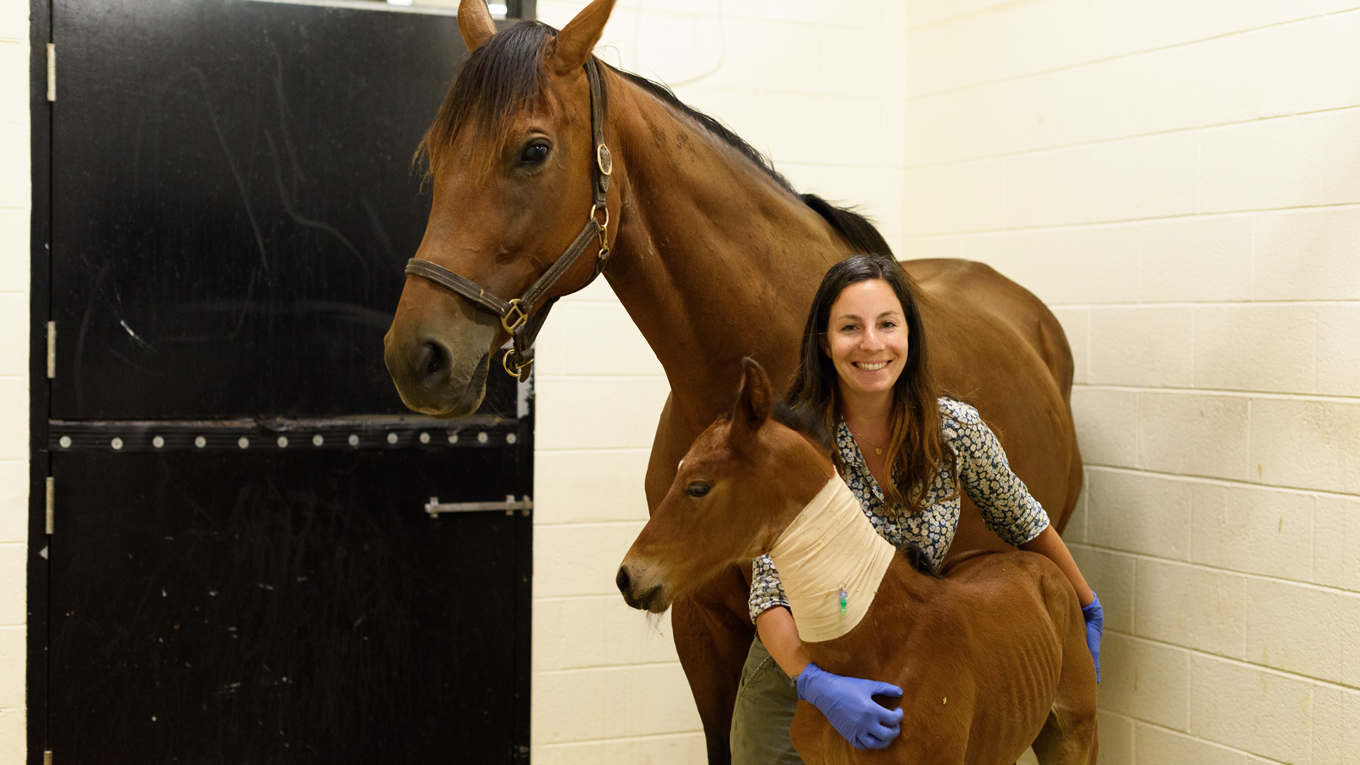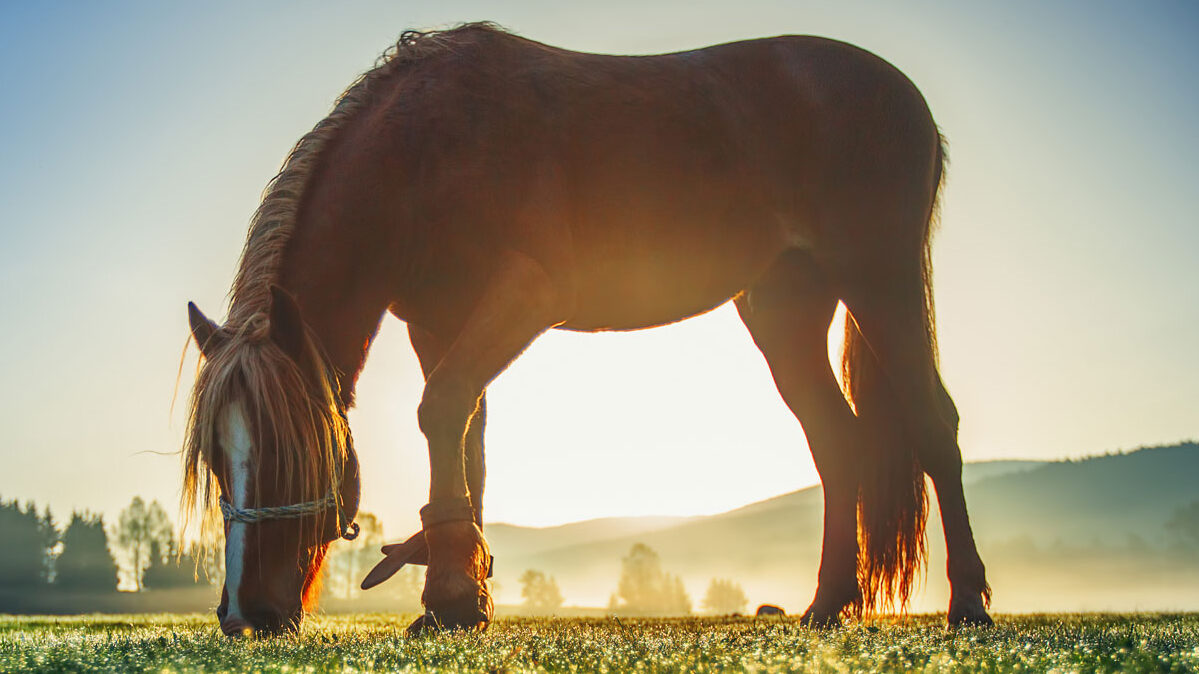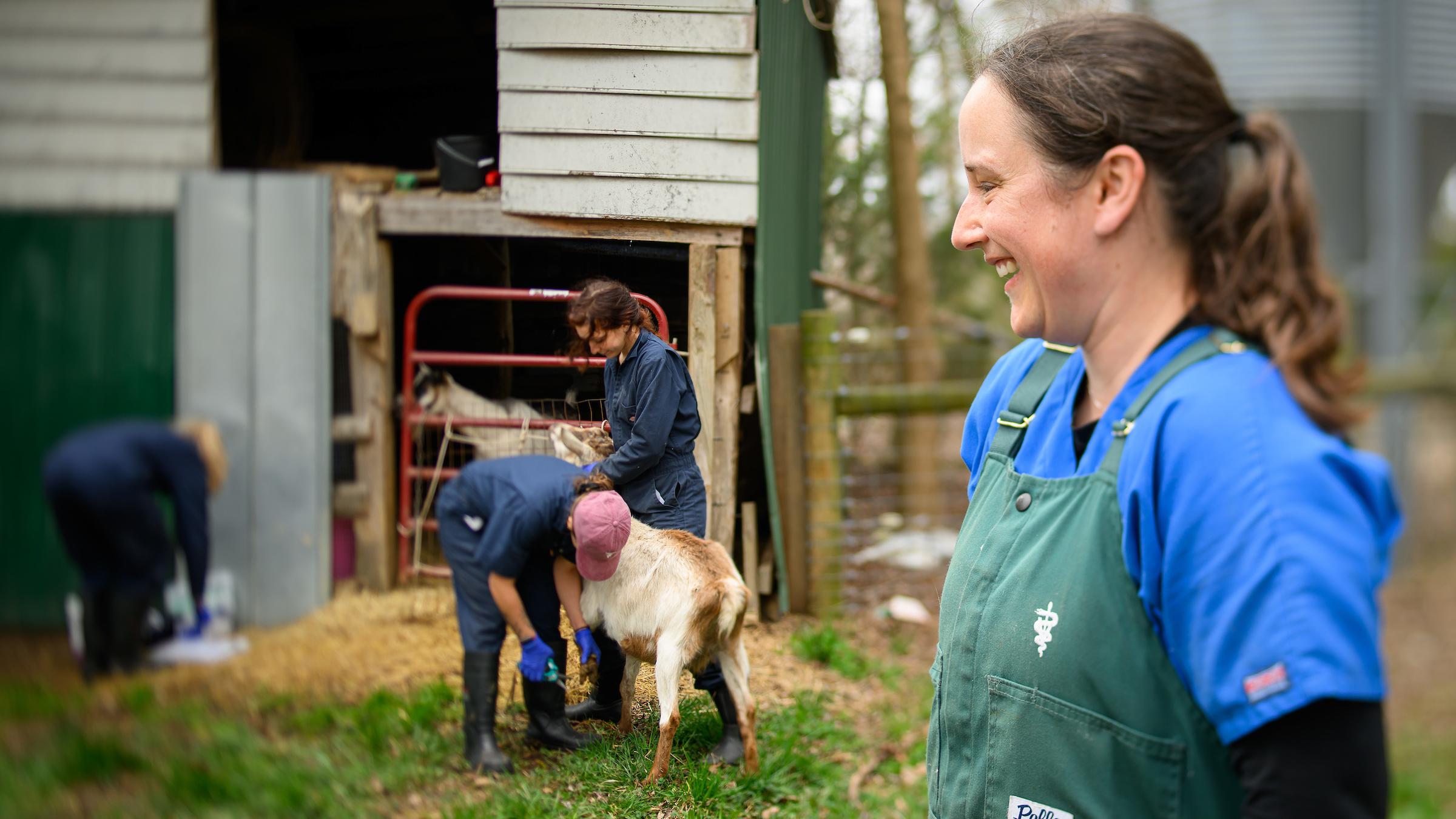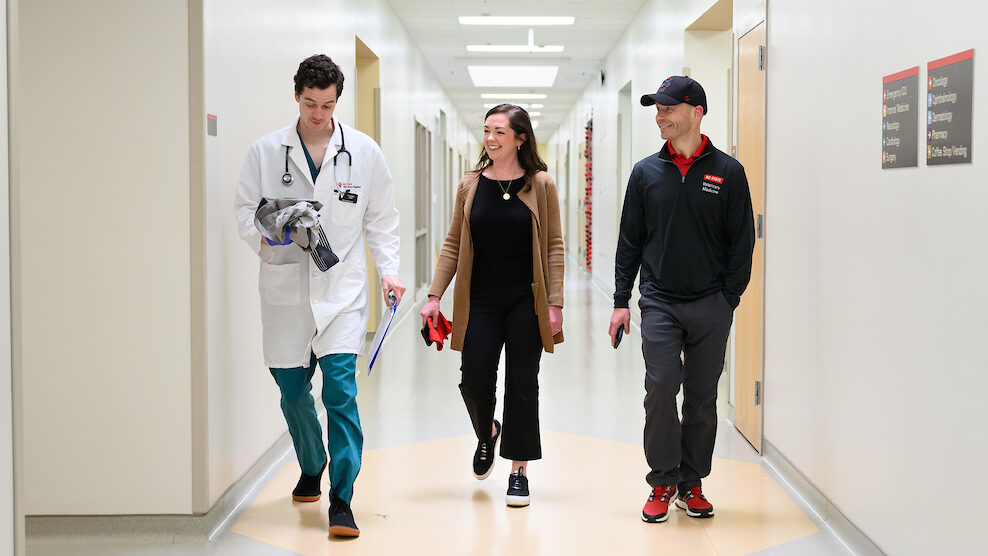A Helping Hand for Critically Ill Newborn Foals

When Nimet Browne was 6, she moved to a small town in Tennessee. Her subdivision was across the street from a barn offering horse riding lessons.
“Every time I passed it I just whined and whined about how badly I wanted to ride horses,” Browne said. “Finally, my parents gave in and that was it. I never looked back.”
That early passion for horses has turned into a dedicated career. This summer, Browne joined the NC State University College of Veterinary Medicine faculty as a clinical assistant professor of equine internal medicine. She’s also leading the equine neonatology service.
Yes, Browne gets to spend a lot of her time with baby horses.
“You are often there the first time they walk, the first time they nurse on their own and the first time they see sunlight,” she said. “You do feel like you’re a big part of their lives.”
Browne, who earned her undergraduate degree in biology from Emory University and her DVM from the University of Tennessee, comes to the CVM after serving as an internal medicine associate at the Hagyard Equine Medical Institute in Lexington, Ky. She was a large animal internal medicine resident at Virginia Maryland College of Veterinary Medicine, a constituent college of the University of Maryland and Virginia Tech, where Browne also earned a master’s in public health.
We talked with Browne about the exciting work of the CVM’s equine service, the power of positivity and more.
What are some of the typical things you see and do in your position?
On a regular day, the internal medicine service functions as a mix between an intensive care unit and a specialized referral center. We see many gastrointestinal cases, including those that have undergone abdominal surgery or have severe diarrhea. Neurologic and respiratory disease are seen routinely, and we see liver, kidney, endocrine and cardiac diseases.
I think you’ll probably find that with most equine internists the best part of the job is working with newborns. It is the most exciting and most rewarding, but also the most challenging, part of internal medicine. As spring comes around, our stalls will be filled with mares and foals.
What kind of newborn cases do you see?
Most of the newborns come in on emergency. Just like people, we generally have a rough idea of when the foal will be born, but nailing down an exact time can be tricky. Foals tend to be born between 1 a.m. and 6 a.m, and most of the time we do not know that there is going to be an issue until the foal is born.
Horses, unlike people, must have the foal within about 30 minutes of starting labor. If this does not occur, there can be delayed oxygen delivery to the foal leading to various complications requiring intensive care.
The bulk of our caseload consists of foals delivered after prolonged labor or those born sick and unable to stand or nurse without assistance. These newborns come into the hospital anywhere from a few hours to a few days old and they usually come in with their mother.
These sick foals require around the clock intensive care to get them through that initial week or two of life. Once they’ve jumped that hurdle, they tend to do quite well, but those first couple days can be really difficult.
How do you deal with that challenging time?
I really enjoy emergency medicine and tend to be really calm during these situations. I try to work through each problem as its comes along because it can be easy to get overwhelmed. We also have a great team here at NC State, so I always have a large, capable staff to back me up. Internal medicine is always better when there is a solid team in place. Knowing the outcome will hopefully be a happy, healthy foal running by its mother in the field makes it all worthwhile.
Is it difficult to say goodbye to the foals?
We get really attached to the newborns. Some of them are on a bed for a week and you help get them up, feed them, clean their butts and wipe their noses, just like you would a human newborn. There is usually a technician or student sitting with them to assure they receive around the clock care. So it is very easy to get attached.
I am very overprotective about the ones that are in the hospital, but ultimately having them leave as healthy foals with so much potential is the goal.
When did you know this is what you wanted to do with your life?
I have never wanted to do anything in my life other than be an equine veterinarian. I thought I wanted to do sports medicine and still find that a fascinating part of equine practice, but working through challenging internal medicine cases has always been really fun for me.
The cases are like puzzles and when you get all the pieces in the right place the sense of accomplishment is unparalleled.
What about our equine service sets it apart?
One amazing thing about being in an academic setting is that you are never alone. You have a whole team to stand behind you and support you. Within the equine medicine group, there are people who have done research in amazing areas, some of them with neonatal foals, others in infectious disease, endocrine disease and cardiology. It is a great asset to be able to draw from their broad range of knowledge. In addition to their research experience, they all have an amazing amount of clinical experience.
Working with some of the top people in the field enables us to provide the best care possible. At any bump in the road there is someone that has had more experience, done more research or tried something novel. This is incredibly unique and allows us to care for the most critical patients.
When you’re not on campus, what do you like to do with the free time you have?
I have been running for years and have a goal to do 50 half-marathons by the time that I am 50. I used to ride horses regularly and now I try to get on a horse as often as I can as it is still a passion of mine.
I also recently bought a kayak and there are a lot of lakes and rivers around here to explore. I try to get my rottweiler, Lexi, to join me but she is not as fond of the kayak as I am.
Does she like it here, too?
She absolutely loves it here, although as she has gotten older her heat tolerance has dwindled. There are so many parks and greenways so she gets to explore quite a bit.
Switching gears, the CVM continues to stress a strong commitment to equine care and research now and into the future. We’re in the middle of a fundraising campaign for equine health services. That must be exciting for the team.
Renovation, expansion and growth has been a constant theme since I started here and with it comes an air of positive energy and enthusiasm. As the horse industry in North Carolina continues to grow, it is important that the university remain at the forefront of innovation. We are here to provide excellent medical care in a top notch institution, while also training future veterinarians. The commitment that NC State has made to further our foothold in equine research and top-notch care is outstanding. It is exciting to be a part of this change.
What does it take to be a good equine vet?
To be the best doctor you can be, you need a strong knowledge base, a lot of experience and great mentors. You need to have the ability to know when you need help and how to learn from your mistakes. Having a great team really helps accomplish all of these things.
The other answer is communication. Building and then maintaining relationships with clients, colleagues, referring veterinarians as well as students is at the core of every good veterinarian. This can be very challenging at times but I truly believe every amazing veterinarian I have known has demonstrated amazing interpersonal skills.
How quick does that trusting relationship happen?
I think surprisingly quick because you’re working with clients in really stressful situations. You build a strong relationship very fast. In my experience, honesty, empathy and kindness are key to that initial interaction. If people feel that you are giving them your undivided attention during a stressful time, they are likely to trust you to help them make difficult decisions.
Relationships can be challenging and require a lot of work in all aspects of life, but usually if you put the work in, they are very rewarding. We have some really amazing clients, patients and referring veterinarians so it is worth the hard work.
What do you hope to bring to the CVM and our equine health service?
I would love to help make NC State “the place” to bring sick foals in North Carolina. By building a state-of-the-art neonatal intensive care unit and increasing our diagnostic and imaging capabilities, we can continue to be leaders in the neonatal field.
Neonatal medicine requires optimism, persistence and passion. I’m a very positive and enthusiastic person and I am excited to be a part of this incredible team. I really love what I do.
For more on the CVM’s equine service, go here.
~Jordan Bartel/NC State Veterinary Medicine
- Categories:


